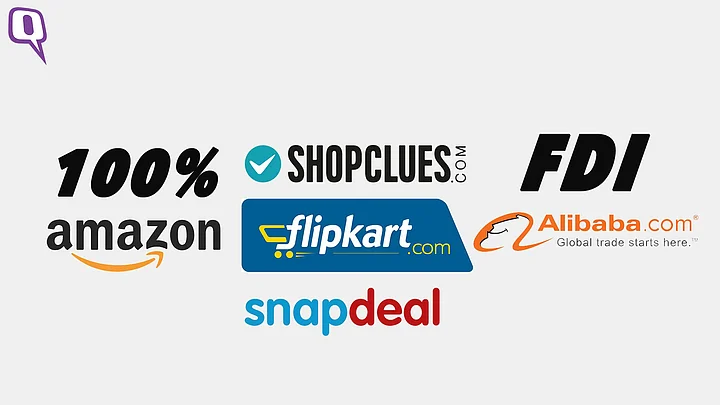The Good, the Bad & the Ugly
- The new guidelines permit 100 percent FDI in the “marketplace” model, but not in the “inventory” model
- This could complicate matters for Flipkart and Amazon, in particular
- Both have merchants (WS Retail for Flipkart, Cloudtail for Amazon) which account for a substantial chunk of sales
- By saying marketplaces cannot influence prices, the government may end up stopping the flow of discounts
- Putting the onus for delivery of goods and customer satisfaction on the seller may result in added complications when it comes to grievance redressal
Valuations of Indian e-commerce companies have been off the rocker for a while now. The discount game too has been taking a toll as intense competition led e-tailers to slash prices, burning investor money in the process. In an attempt to restore some sanity, and provide much-awaited clarity to the sector, the government released guidelines for Foreign Direct Investment (FDI) in the sector, applicable with immediate effect.
Apart from regulations for FDI in business-to-consumer (B2C) e-commerce, proper definitions have now been introduced for certain key terms like e-commerce, e-commerce entity, ‘inventory’ and ‘marketplace’ based model of e-commerce.
What Constitues an E-commerce Business?
While e-commerce has been defined to mean buying and selling of goods and services including digital products over digital and electronic network, an e-commerce entity has been given a wide definition to mean any Indian company or a foreign company or office, branch or agency, conducting the e-commerce business.
In a marketplace model, the e-tailer acts as a facilitator between buyer and seller. An inventory-based model has been defined to mean an e-commerce activity where inventory of goods and services is owned by the e-commerce entity and sold directly to end consumers.
Some E-tailers May Have to Rethink Their Strategy
While FDI has not been permitted in the inventory
based model of e-commerce, 100 percent FDI under automatic route has been permitted in
the marketplace model of e-commerce with riders.
One key rider is that the e-commerce entity will not permit more than 25 percent of the sales affected through its marketplace from one vendor or their group companies.
The intent behind this seems to be to ensure that the platform owners eventually do not turn into sellers. This could have a major impact on home-grown players operating as a marketplace while servicing the end customers primarily through their group companies or under an arrangement with dominant sellers who list their products on the portal. They would now have to realign themselves in light of these guidelines.
Will The Guidelines Make a Difference to Alibaba’s Proposed India Entry?
The guidelines could also impact potential entrants into the Indian e-commerce market like an Alibaba which, according to sources. was proposing a full-fledged entry into India as a B2B e-tailer and eventually planning a B2C model. However, some of the overseas brick & mortar giants which operate in India only through a B2B business model may not have any impact.
Further, the press note issued by the DIPP allows an e-commerce marketplace to provide support services to sellers in respect of warehousing, logistics, order fulfilment, payment collection and other services. This would certainly provide comfort and clarity to some of the e-tailers who already operate on diversified models, also providing services as listed above, apart from being a marketplace.
‘Can’t Influence Prices’ and Other Regulations
To ensure a pure marketplace level playing field, now marketplace-based entities can’t directly or indirectly influence the sale price of goods or services.
Conditions have also been laid down to bring express clarity on many aspects. Warranty/guarantee of the goods and services in a marketplace model will be the responsibility of the seller. Also, an e-commerce entity operating in a marketplace will not exercise ownership over the inventory. This is because ownership over goods purported to be sold would render the business into an inventory model where FDI has been specifically prohibited.
The guidelines also aim to ensure transparency. In a marketplace model goods/services made available for sale electronically should bear the name, address and other contact details of the seller while ensuring that the post sales, delivery and customer satisfaction would be the responsibility of the seller.
Industry Hails FDI Move, Consolidation Ahead
The reiteration of the FDI policy on the service sector and the sale of services through e-commerce under automatic route is being seen as a positive move by the industry.
With most of the loose ends tied up and FDI concerns addressed, it is almost certain that many of the global e-commerce players would now be finalising their India entry plans, given the clarity. This may also lead to increased competition in this sector which may eventually lead to long-term consolidation in this space where only the toughest players with deep pockets will survive and grow.
As far as end customers are concerned, while they would certainly benefit in terms of increased options, whether the benefits of added discounts would continue from e-commerce players (especially considering that such players may not be able to influence the pricing of goods) is something which would only unfold over time.
(The author is a senior consultant at EY)
